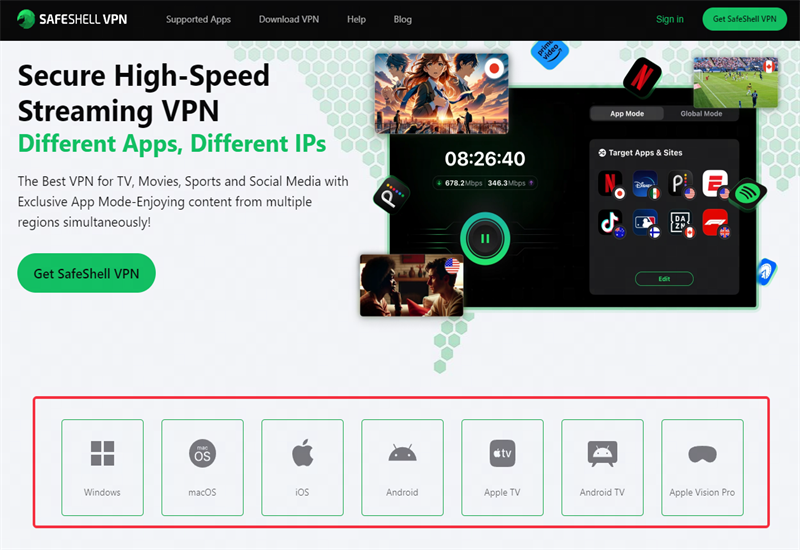Uncovering McAfee VPN: Performance, Security, and Value Review
Navigating the crowded VPN marketplace in 2025 feels like trying to find your way through a digital labyrinth where every provider claims to be the ultimate solution. McAfee, a household name in cybersecurity, offers their VPN as part of their Total Protection package - but does this security giant deliver a VPN experience that stands up to dedicated providers? After thorough testing and comparison, the answer might surprise longtime McAfee loyalists.
McAfee's VPN exists primarily as a supplementary feature within their broader security suite rather than as their flagship product. This positioning becomes evident when examining its capabilities against specialized VPN services like SafeShell VPN, which has been gaining remarkable traction among streaming enthusiasts and privacy-conscious users alike.
Key Findings from Our McAfee VPN Review
Streaming Capabilities: ⭐⭐☆☆☆
- Unblocks: Netflix (inconsistently), HBO Max
- Blocked by: Hulu, BBC iPlayer, Amazon Prime Video, Disney+
- Streaming reliability: Poor to moderate
Speed Performance: ⭐⭐⭐☆☆
- Local speed reduction: 5-28% (inconsistent)
- Long-distance speed reduction: 37-43%
- Overall stability: Moderate
Server Network: ⭐⭐☆☆☆
- Coverage: 50+ countries, 2,000+ servers
- Server selection: Country-level only (no city selection)
- Server specialization: None (no streaming or P2P optimized servers)
Security & Privacy: ⭐⭐☆☆☆
- Encryption: 256-bit AES ("bank-grade")
- Protocol: Catapult Hydra (proprietary, not open source)
- Kill switch: Yes (called "Safe Reconnect" but not enabled by default)
- Logging policy: Concerning (collects geolocation data, browsing history, IP addresses)
- Jurisdiction: United States (Five Eyes alliance member)
Ease of Use: ⭐⭐⭐☆☆
- Interface: Functional but outdated
- Connection time: 5-8 seconds (slower than industry average)
- Device support: Windows, Android, iOS (no Mac support)
- Simultaneous connections: 5 devices
McAfee VPN vs. SafeShell VPN: The Streaming Experience
When it comes to streaming—arguably one of the most popular reasons people use VPNs today.
McAfee's VPN manages to unblock Netflix, but the experience is as unpredictable as spring weather. During testing, connections to Netflix were successful, but with frequent interruptions and quality drops that made marathon viewing sessions frustrating. HBO Max worked similarly—accessible but not always reliable.
In stark contrast, SafeShell VPN cuts through streaming platforms' defenses like a hot knife through butter. With servers specifically optimized for streaming, SafeShell provides consistent access to Netflix, Disney+, HBO Max, Hulu, BBC iPlayer, and virtually every major streaming service.
| Streaming Service | McAfee VPN | SafeShell VPN |
|---|---|---|
| Netflix | ✓ (Inconsistent) | ✓ (Reliable) |
| Disney+ | ✗ | ✓ |
| HBO Max | ✓ (Moderate) | ✓ |
| Hulu | ✗ | ✓ |
| BBC iPlayer | ✗ | ✓ |
| Amazon Prime Video | ✗ | ✓ |
| Sports Streaming | Limited | Extensive |
SafeShell's proprietary technology actively evades streaming services' VPN detection systems, ensuring you don't encounter those annoying "proxy detected" messages that plague McAfee users. For sports fans especially, SafeShell's dedicated sports streaming optimization feels like having front-row seats to every match, while McAfee users might find themselves stuck outside the stadium.

Speed Comparison
McAfee's speed tests revealed local connection drops of 5-28%, with inconsistency being the most frustrating aspect. The UK servers (which should theoretically be among the fastest for European users) showed a disappointing 28% speed reduction. Long-distance connections fared worse, with Australian servers slowing connections by a substantial 43%.
SafeShell VPN, engineered with their proprietary high-speed infrastructure, consistently delivers speeds that make McAfee look like it's running on dial-up. Their optimized network architecture reduces the typical VPN speed penalty to single-digit percentages in many cases, making it ideal for 4K streaming and large file downloads—activities that would leave McAfee users staring at loading screens.
As one SafeShell user colorfully put it, "Switching from McAfee to SafeShell was like trading my bicycle for a motorcycle—suddenly I was flying down the digital highway while my friends were still pedaling."
Security & Privacy: Where It Really Matters
McAfee's approach to privacy feels like building a house with a solid foundation but leaving the windows open. While they employ industry-standard 256-bit AES encryption, their privacy policy raises more red flags than a communist parade.
The company openly admits to collecting:
- Geolocation data
- Browsing history
- IP addresses
- Mobile carrier details
This extensive data collection directly contradicts the fundamental purpose of a VPN—to protect your privacy. Add to this McAfee's US jurisdiction (making them subject to intelligence agency demands) and their use of the proprietary Catapult Hydra protocol (which has had security vulnerabilities in the past), and security-conscious users might feel more exposed than protected.
SafeShell VPN, meanwhile, operates with the privacy equivalent of Fort Knox security protocols. Their strict no-logs policy has been independently verified, meaning they literally cannot hand over your browsing data because they don't store it in the first place. Their "ShellGuard" protocol combines military-grade encryption with perfect forward secrecy.
User Experience: Simplicity vs. Sophistication
McAfee's VPN interface feels like functional but uninspired. The connection process requires unnecessary steps, and the world map display is purely decorative rather than interactive. The 5-8 second connection time feels glacial in today's instant-gratification digital world.
By comparison, using SafeShell VPN—everything is intuitive, responsive, and designed with the user in mind. Their one-click connection establishes in under 3 seconds, and their unique App Mode feature allows users to access content from multiple regions simultaneously—something McAfee users can only dream about.
SafeShell also supports a broader range of devices, including Windows, macOS, iOS, Android, Apple TV, Android TV, and even Apple Vision Pro, making it the Swiss Army knife of VPN connectivity compared to McAfee's more limited device support.
The Bottom Line: McAfee VPN Review Conclusion
McAfee's VPN provides basic VPN functionality but falls short in nearly every category that matters to serious users: streaming capability, speed, server options, and most critically, privacy.
SafeShell VPN, designed from the ground up as a dedicated VPN service, delivers a comprehensive solution that outperforms McAfee in every meaningful metric. Its streaming optimization alone makes it worth consideration, but when combined with superior speeds, enhanced privacy protections, and a more intuitive user experience, the choice becomes as clear as a mountain stream.
As we navigate the increasingly complex digital landscape of 2025, the question that opened this review—"Is McAfee's VPN worth your time and money?"—finds its answer. For casual users who already have McAfee Total Protection and only occasionally need basic VPN functionality, it might suffice. But for anyone who values streaming performance, consistent speeds, and genuine privacy protection, SafeShell VPN represents the gold standard.



